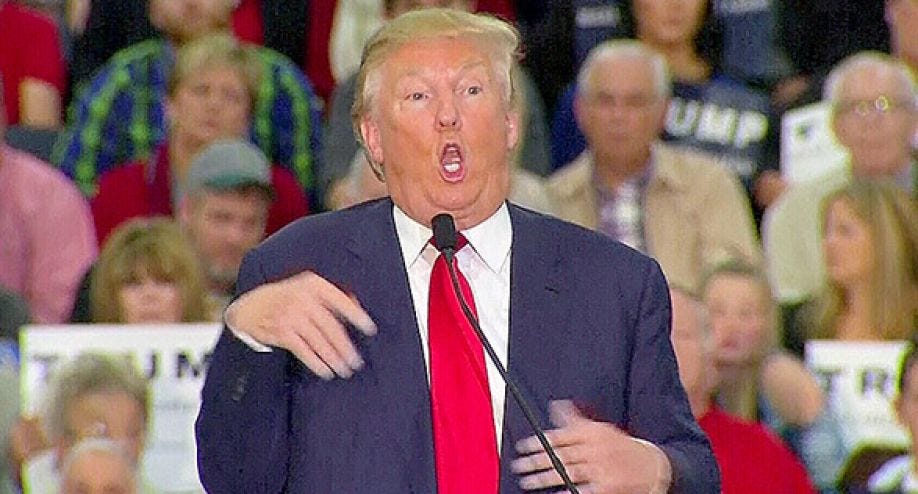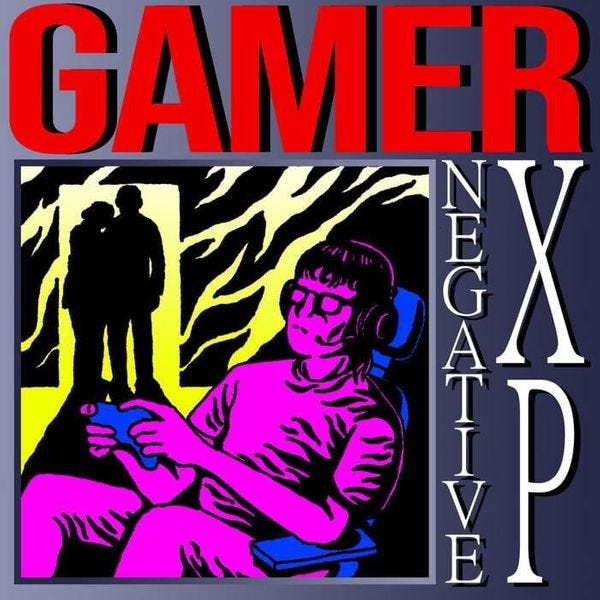Video Game Review: The Presidency of Donald Trump 2017-2021
Video game reviews for the New Millennium
As I have previously stated, the time has come for us all to start taking this stuff seriously. Nihilism is taking life literally, but not seriously. Faith is taking it seriously, not literally. God is, structurally, a joke. It’s time to grow up. It’s time ascend to the next level. Making Anime Real is going to have to wait. First, we have to make video games real. First, we have to make video game reviews real.
Introduction
In 2016 I was convinced The Presidency of Donald Trump 2016-2021 would never be released. I assumed it was Star Citizen 2, failware and pure marketing that would never be finished. A financial scam, but like Star Citizen, kind of interesting to watch unfold. I awoke that November morning to mild shock – they actually put out a game. There had been no gameplay reveals, only pre-rendered cutscenes and big promises, and then suddenly out of nowhere, bam, released a full game.
I only logged in to the game some months later, in 2017. Instantly I realised that I had missed a lot of drama and community lore that had developed over the open beta through 2015-16. Despite this, I made grandiose claims, to the extremely busty african-american girl studying abroad, who I was trying to fuck at the time (we’re talking, G cups), and I said something like, “I don't think it’s going to be that abnormal – it’s an indie production, sure, but it’s deliberately trying to succeed in AAA development, and fit in. I don’t think it’s as much a break with format as it is just a fluke, that will be integrated into the industry and bought out”. I think in some ways I was right, and in in other’s I was way off. But I really wanted to fuck her, so I played it off as if I was cocksure about it.
Story and world-building
The way the story is told in the Presidency of Donald Trump 2017-2021 takes a lot of inspiration from eastern games, especially the Fromsoft’s Souls game series, or in the western video game tradition, in traditional RPG’s, where the story and especially lore, is told “indirectly”. Rather than a clear narrator, you are invited to puzzle out both the lore of previous events, as well as everything currently happening, from item descriptions and various indirect sources. In fact, in the Presidency of Donald Trump, it is taking what Dark Souls did to lore, and building on top of it, applying the technique also to the very plot of the game itself, as it unfolds.
This makes it uniquely engaging, and offers a deeply personal journey of untangling the story – both backwards in retrospect, and forwards into the future – as you are simultaneously co-authoring it. A multi-player PVP option unlike anything ever seen or designed before appears naturally from this, of “competing interpretational”, competing narratives. The player-base engages in a kind of competition that is simultaneously competitive and cooperative, to a degree and on a scale that anything we’ve ever seen since EVE online. You could say, in a sentence, it’s EVE online for the rest of us, EVE online for the masses. A completely unique experience that cannot be reproduced.
A general overview of the core story and lore, is as follows: In a time of great economical uncertainty and social unrest, due to a series of technological innovations causing a Third Industrial Revolution, there is a massive unelected bureaucracy controlling political power and national finances with no oversight, in the world’s sole military super-power. In the midst of social, military, economical and spiritual chaos, Business tycoon Donald Trump is elected to, nominally, the most powerful political position in the world, on a populist mandate to clean up the unelected bureaucracy and restore order and self rule to the common man. Of course, it isn’t that easy, and a great information war of 4d chess between a great amount of organisations with separate beliefs and goals is ignited, and it is the players role to navigate this informational battlefield, and choose which faction to ally with – or start their own.
A million different side quests and offshoot storylines flesh out the world, but at some level their all ultimately relate to this core narrative problem. The world is incredibly rich with flavour and interesting side characters – who’s personal dilemmas and problems are often so engaging that you forget about the main plot. There is an embarrassment of riches of optional content, that all intersects with the core themes of the work, which is centred around the election of Donald Trump to the position of President of the United States of America.
Donald Trump is narratively an absentee central figure, and the player rarely if ever directly interacts with him. Instead he functions as a Moby Dick-like figure, a central point around which the whole world spins. He is neither protagonist nor antagonist, and simultaneously both. He is an active force in the game world, but never directly and only through second hand information – it is up to the player to interpret what, exactly, Donald Trump ever actually does, based on limited and biased information. This design philosophy is carried all the way to the climax of the game, which I will discuss later. We as the players are invited to explore the figure of Donald Trump as a way to tie together storylines that would otherwise be difficult to write together in a coherent way.
Across the game’s story, spanning 4 years, various “Big Events” happen that impact the side stories in various ways. Assassinations are carried out, childhood prostitution rings, honey pots, even hinting towards hidden societies, cults and the super-natural – which the player is all invited to explore and investigate on his own terms, to his own abilities. Or, you can choose to avoid it all and focus on simple PVP arenas called “quote tweets”, where you compete for a special PVP currency (“followers”) which can be used to buy prestige items, or even be turned into normal in-game currency, through the mechanic called “starting a podcast”.
The “Big Events” vary in scale and severity and many are easter egg jokes, usually involving Donald Trump making a comical statement that is overtly and hysterically overblown for comedic effect. These are mostly funny but do wear out in novelty over time, and you would have liked to see a few more “real” “big events”.
The biggest major story event happens midway through the game, with the arrest and mysterious death of one of the Characters you could have discovered earlier in the game if you focused on certain side quests, Jeffrey Epstein, a mysterious spy-pimp with relations to almost every important character and organisation in the game, who narratively works as a sort of deconstruction of the motif of a “james bond” figure. His suspicious death in prison kick starts a long string of reactions in the various factions, and while it is not directly stated due to the non-linear and indirect nature of the storytelling, it is implied that this at the very least echoes and influences – somehow – the climax of the game, the 2020 Presidential election. Although how, again, is up to the player to to investigate.
Ending/spoilers
The climax of The Presidency of Donald Trump 2017-2021 is a deconstruction of the kind of “ending” that has been popularly unpopular in video games, starting with Mass Effect 3. In mass effect three, the player was promised branching, separate endings, depending on choices made across the game series, and was instead met with a simple choice of three superficially different endings. In The Presidency of Donald Trump, after a game of a million choices and interpretations, you are presented with a single, on-rails cutscene, of a bunch of middle class protesters “storming” the capitol building. There is no choice involved, and no matter what you did during the game, you get the same ending. But the curious thing is, despite being the only ending, every player can interpret it in a myriad of ways.
Was it a genuine populist uprising? If so was it justified? Was it a terrorist attack? Was it a CIA controlled opposition false flag? Was it a colour revolution? In offering only a single ending to the story, The Presidency of Donald Trump ironically provides a much broader scope of variability than anything we’ve ever seen in branching storylines in video games.
Controls
The controls are a rare case of “easy to learn, hard to master”, something we rarely see in the video game industry today. Setting up an account and starting the game is as easy as setting up a twitter account, logging in, and then writing away.
Interestingly, there is no way to play the game with a controller, but only with a mouse and keyboard, or, a mobile phone. A kind of strange cross-platform design approach.
In terms of hard to master, this applies both to the technique of writing and engaging with the game-world, but also on a technical level – all the information about how to, for example, set up a VPN is available organically within the game world, but it has to be sought out by the player. The more serious and skilled a player, the more he will realise the value of so-called “op-sec”, which is short for “operational security”, which translated roughly to armour or health upgrades in a more classic action/fighting game.
This processes is neatly integrated into the game in a way that is neither front-loading the player with tutorials, not condescending to his ability. A sort of “sink or swim” approach, but designed in a way that if you don’t know about it, you don’t even notice that you’re sinking.
Gameplay
The gameplay is hard to box in in a single genre – it is many at once, and in many ways a complete innovation. The free-form nature of it could be said to contain entire genres in their entirety. Much of it is text based, especially at the higher levels of play, but for someone who is only interested in, for example, action PVP, there is a niche of the game for him too, by taking to the streets and engaging in streets brawls – all it requires is a “camera man”, which the game generously supplies.
My personal experience with the game could best be described as “interactive detective-fiction”, with occasional periods of engaging in quote tweeting battles or playing around with the “starting your own faction” politics minigames, or the creative sandbox stuff where you can just create little funny pictures in the game-world, for prestige currency (followers, etc).
The more interesting aspects in my play-through was digging into the lore, political and historically, and immersing myself in the many “crazy” “wacky” factions of the world with their unique philosophies and ideas.
After a while though, I branched out into the physical path, and began looking into weight lifting and spiritual development, which I could honestly write an entirely separate review about, about the ways it influences the core info-war gameplay.
Sound/Music
Generally the sound design is nothing to write home about. It seems like much of the game was designed around the expectations that the players would simply turn off the game music and use their own. The internal music is offensively bad, and the sound mixing is horrendous.
Very rarely there are exceptions to this, with things like the “Negative XP” and “Eggy” side-stories, which are in a broad sense, about musicians perspective on the Third Industrial Revolution, which compared to the backdrop of generally offensively band soundtracks stand out all the stronger for it.
Presentation/Graphics
Much of the presentation is just barebones, workable, but it is elevated through a hidden side-story about interface-design, which you can unlock by investigating the correct combination of tech trees, which I won’t spoil here – but a breadcrumb would be, interface design and the design of the so called “smart Phone” item’s history. Once you unlock the correct combination of information, this is one of many ways of achieving a buff called “dark enlightenment”, which radically changes the entire gameplay experience, and also in a way the graphics/presentation itself.
Around the middle of the game, after the player has become comfortable navigating the game world, new mechanics are continually introduced, one of which is so called “deep fakes” technology, which changes both how you view the game, and can be retroactively applied to the previous game time, depending on when you think the technology was REALLY invented – and by whom.
Price
In an interesting, novel, and innovative economic decision the game is not priced, and yet it is not a “free to play game”. Instead, it is a form of gamble, in which the stakes are your very soul.
Future/sequels/dlc
Despite my praise for the writing of the ending of the game, and my initial reaction of thinking it was very, very funny, after a moment of contemplation I think it’s very deliberate sequel-bait, of ending on an unresolved cliff-hanger.
The many plotlines are not really resolved in any way, and while it would be impossible, and beyond the scope of the narrative to do so, it would have been nice is there was at least a little bit of narrative payoff on one of the main plot-lines in the end, rather than a cheap deconstruction and commentary on video games writing in general.
I think most players are in some way disappointed with the ending, but it may be the was exactly what the games industry needed to hear at this point in time, to move the medium to the next level.
Final Score
7/10













It was a very difficult choice between a picture of trump and a picture of big tits for the embedded picture for this
also I have no way of reaching Blank, please tell poster "Punished Blank", in response to his tweet "Any good books on logistics?" to please read "the box" my marc levinson